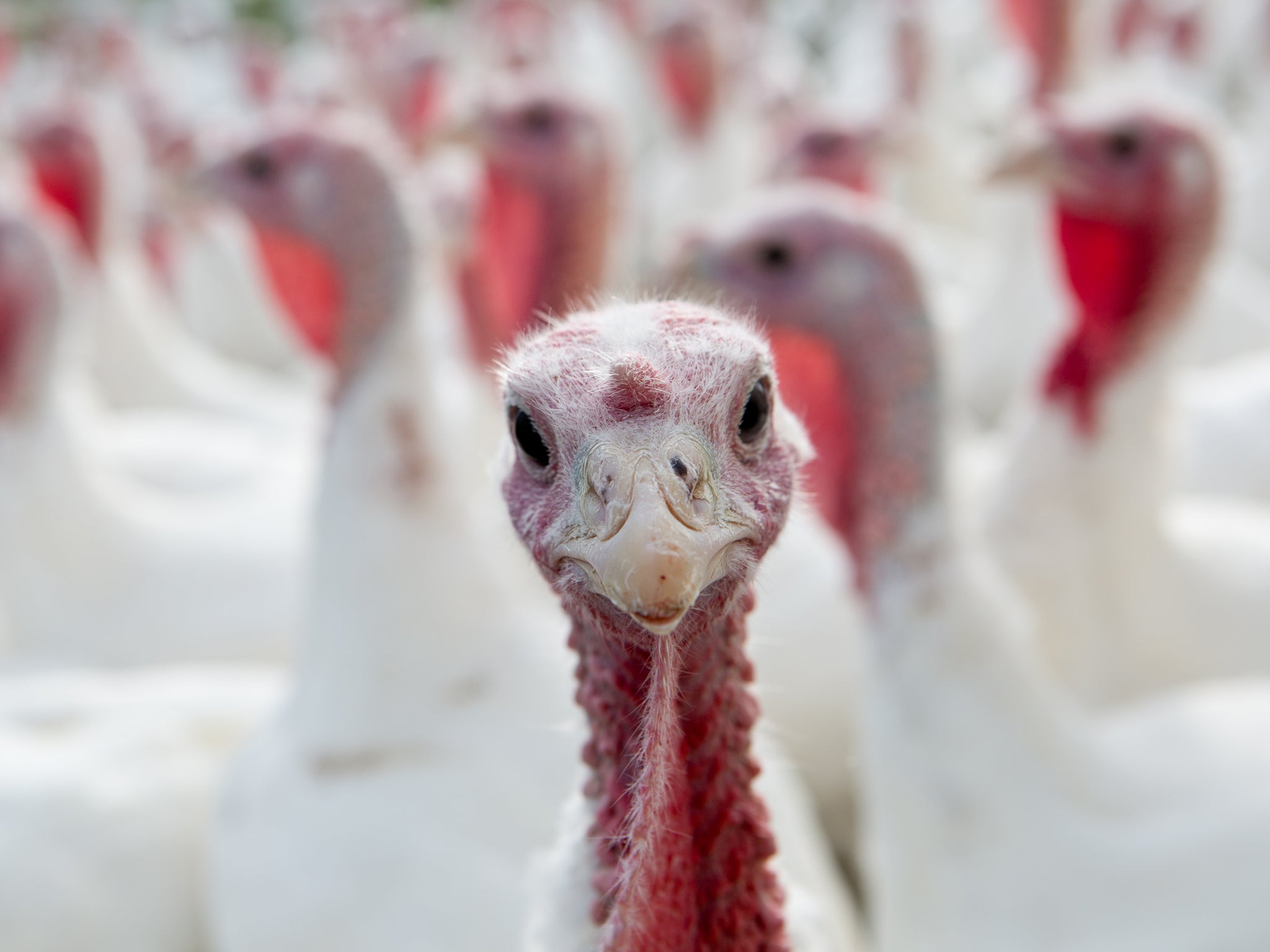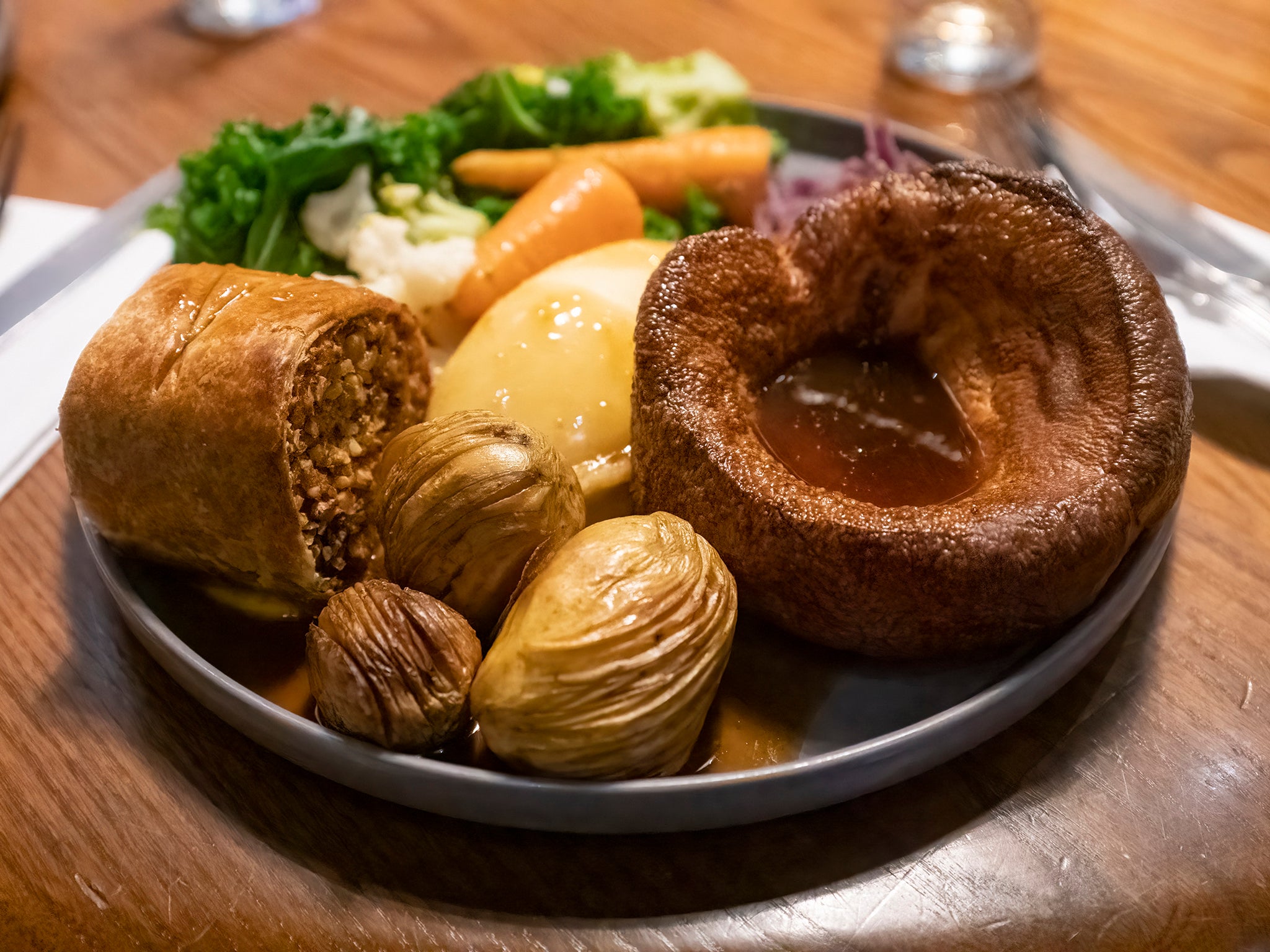The Independent's journalism is supported by our readers. When you purchase through links on our site, we may earn commission.
Why I’m choosing tofu over turkey this Christmas
Inhumane farming practices, an unaffordable environmental cost and a direct impact on human health mean Christmas’s favourite roast meat has lost its festive cheer. Dr Shireen Kassam says its time to toss the turkey and try tofu


Your support helps us to tell the story
From reproductive rights to climate change to Big Tech, The Independent is on the ground when the story is developing. Whether it's investigating the financials of Elon Musk's pro-Trump PAC or producing our latest documentary, 'The A Word', which shines a light on the American women fighting for reproductive rights, we know how important it is to parse out the facts from the messaging.
At such a critical moment in US history, we need reporters on the ground. Your donation allows us to keep sending journalists to speak to both sides of the story.
The Independent is trusted by Americans across the entire political spectrum. And unlike many other quality news outlets, we choose not to lock Americans out of our reporting and analysis with paywalls. We believe quality journalism should be available to everyone, paid for by those who can afford it.
Your support makes all the difference.Turkey has become synonymous with Christmas, but this conveniently hides a horrible truth.
More than 47 million turkeys were killed for Thanksgiving in the US and 10 million will be killed for Christmas this year in the UK. Most are raised indoors in factory farms, which can house up to 25,000 birds in one building, where they never experience a life outdoors, in natural air or light.
These conditions have put poultry farms at the centre of the next pandemic threat. In the US alone this season, 50 million turkeys died or were killed due to avian flu. In the UK, there have been more than 200 outbreaks of the disease since October 2021. Such is the threat to public health that all farm birds have been ordered to be kept indoors since 7 November. So there will be no “happy turkeys” on the shelves this Christmas.
Why as a practicing hospital doctor in a healthcare system that is near breaking point am I concerning myself with turkey consumption? For me, this is a wider issue concerning our broken food system. Not only is an unhealthy diet, too high in meat and ultra-processed foods, the leading cause of death and disability globally, but the food system, dominated by animal agriculture, is a leading driver of the climate and biodiversity crises and producer of land and water pollution.
These issues are directly affecting the health of my patients. The global healthcare community is calling for a “one health” approach to healthcare because it is clear that optimal health outcomes can only be achieved by recognising the interconnection between people, animals, plants and their shared environment.
When it comes to eating meat, it is still commonplace to hear that choosing “white meat” from poultry is a healthy choice that provides “high quality” protein. After all, isn’t that why turkeys are genetically bred to have unnaturally large breasts, even though it leads them to have a number of health problems?
It turns out turkey may not be the healthy choice after all. When considering well-established risk factors for heart disease, white meat from poultry elevates blood cholesterol levels to a similar degree to red meat. It also increases the risk of developing high blood pressure and type 2 diabetes and contributes significantly to weight gain. Regarding cancer, it is usually red meat consumption that is considered a risk factor, but poultry consumption has been associated with an increased risk of developing lymphoma, a cancer of the lymphatic system. Turkey is often eaten in the form of deli meats during the festive season and these processed cuts have been found to be a direct cause of colorectal cancer.

The farming of turkeys is adversely affecting our health in a number of other ways. Factory farms are a breeding ground for antibiotic resistant bacteria, which are now contaminating our land and rivers. This issue was highlighted only recently by the results of a new study showing that rivers and waterways near factory farms are being polluted by antibiotic resistant bacteria originating from animal manure. The implications of this cannot be underestimated, with antibiotic resistant infections already resulting in almost 1.3 million deaths globally in 2019. A key part of the solution is to dramatically reduce the consumption of animals. If we were to limit our meat consumption to 40g a day, we could reduce the use of antibiotics in animals reared for food by 66 per cent.
Air pollution is also a major health threat and often considered a consequence of the use of fossil fuels in transportation. In fact, our food system is a major contributor with an estimated 80 per cent of this pollution generated by animal agriculture through the use of fertilisers and pesticides for growing their food and from the accumulation of animal waste. Raising animals for food, including turkeys, also contributes significantly more greenhouse gas emissions and requires more land and water than the majority of plant-based foods.
If you are convinced by these arguments for ditching turkey this Christmas then what would be a good alternative?
Sadly, your Christmas turkey will have already hatched and have spent their short five to six months of life in the squalid conditions of a factory farm. These intelligent, social and affectionate birds have never been able to display their natural behaviours
Here is where tofu would be an excellent choice. Made from the leguminous soya bean plant, it not only has an array of health benefits, but its production also has significantly less environmental impact, while having the ability to fix nitrogen from the atmosphere, helping to regenerate the health of our soils.
Tofu is a great source of protein, having the same biological value as animal protein, and also provides a healthy source of fat and various other nutrients such as selenium, iron and calcium. Decades of scientific research has consistently shown that tofu consumption can reduce the risk of some of our most common chronic conditions, including heart disease, in part due to its cholesterol-lowering properties, type 2 diabetes, and a large number of cancers. It also improves kidney, bone and brain health. If that were not enough, soya can also help reduce hot flushes in women during the menopause.
In fact, swapping turkey for any legume, including beans and lentils, is a great choice for health, reducing the risk of early death from a number of causes. So if you are in the rare position of having a soya allergy you can still find healthy alternatives to turkey.
Meat-free diets in general are associated with significantly lower rates of heart disease and cancer, while a vegan diet has the lowest environmental impact and in the UK would cost a third less than the typical British diet. If we were to all switch to a vegan diet we could release 75 per cent of farmland back to nature and reduce food-related greenhouse gas emissions by more than 60 per cent. Despite the widespread belief that soya consumption is driving deforestation in the Amazon, more than three-quarters of this soya is grown to feed farm animals, with only 7 per cent used for human consumption. Most soya foods in the UK come from beans grown in Europe or the US and are not contributing to Amazon deforestation.
Sadly, your Christmas turkey will have already hatched and have spent their short five to six months of life in the squalid conditions of a factory farm. These intelligent, social and affectionate birds have never been able to display their natural behaviours.
I take some comfort in the stories of Colin and Susan, two turkeys rescued from the dinner table by Good Heart Animal Sanctuary, now living a full life. They are waiting to be adopted into a loving home to enjoy the next 10 years in peace without the threat of a gas chamber.
It may be too late for some this year, but I hope that as a society we will switch to food traditions that are not only better for our health but kinder and more compassionate to the planet and all the animals we share it with. I look forward to the day when celebrations involve enjoying glazed tofu roast, roasted cauliflower, lentil shepherd’s pie, mushroom wellington and a nut roast, which are not only delicious and nutritious but are easy to make and climate friendly.




Join our commenting forum
Join thought-provoking conversations, follow other Independent readers and see their replies
Comments